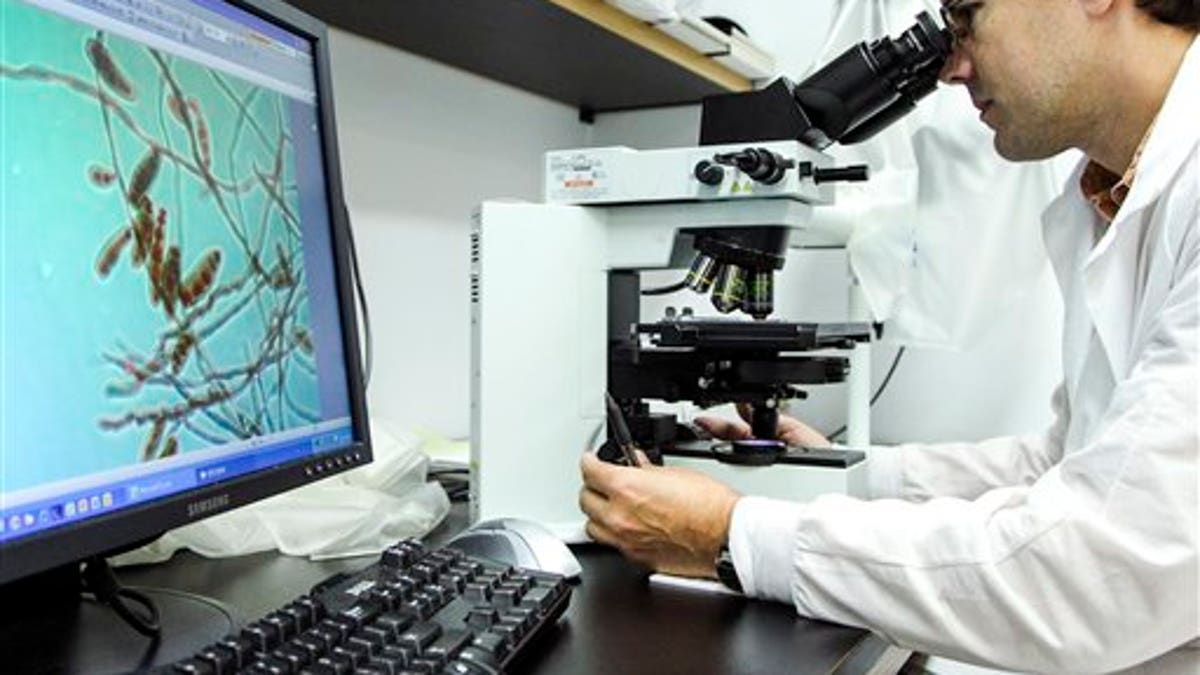
Shawn Lockhart looks at the meningitis-causing fungus Exserohilum rostratum at the mycotic lab at the Centers for Disease Control and Prevention on Oct. 12, 2012 in Atlanta. The staff and technicians have been working around the clock to confirm cases and inform the public regarding the multi-state meningitis outbreak that has resulted in 14 deaths. The fungal outbreak is believed to have started at New England Compounding Center where a steroid injection shipment was contaminated with the fungus. (AP Photo/Pouya Dianat) (AP)
Thanks to an international effort involving more than 100 institutions and genetic tests on 200,000 people, scientists have uncovered dozens of signposts in DNA that can help reveal a person's risk for breast, ovarian or prostate cancer.
Released on Wednesday, the findings are the latest mega-collaboration to learn more about the intricate mechanisms that lead to cancer.
For most people, the biggest payoff of the headway is that someday there may be genetic tests that help identify women with the most to gain from mammograms, and men who could benefit most from PSA tests and prostate biopsies.
"This adds another piece to the puzzle," said Harpal Kumar, chief executive of Cancer Research U.K., the charity which funded much of the research.
One analysis suggests that among men whose family history gives them roughly a 20 percent lifetime risk for prostate cancer, such genetic markers could identify those whose real risk is 60 percent.
- Revolutionary New Breast Cancer Drug Approved by FDA
- Number Skills in First Graders Can Predict Math Performance Later On
- Medical Breakthrough as Baby Born With HIV Cured, Say Scientists
- BMI Calculator Inaccurate, Says Oxford Professor
- New Study Shows Genetic Link in Common Mental Disorders
- Scientists Aim to Map and Save Endangered Habitats
- Mummies Know Best: Heart Disease a Natural Part of Aging
- The Titanic 2.0
The markers also could make a difference for women with BRCA gene mutations, which puts them at high risk for breast cancer. Researchers may be able to separate those whose lifetime risk exceeds 80 percent from women whose risk is about 20 to 50 percent. One doctor said that might mean some women would choose to monitor for cancer rather than taking the drastic step of having healthy breasts removed.
Scientists have found risk markers for the three diseases before, but the new trove doubles the known list, said one author, Douglas Easton of Cambridge University. The discoveries also reveal clues about the biological underpinnings of these cancers, which may pay off someday in better therapies, he said.
Experts not connected with the work said it was encouraging but that more research is needed to see how useful it would be for guiding patient care. One suggested that using a gene test along with PSA testing and other factors might help determine which men have enough risk of a life-threatening prostate cancer that they should get a biopsy. Many prostate cancers found early are slow-growing and won't be fatal, but there is no way to differentiate and many men have surgery they may not need.
Easton said the prospects for a genetic test are greater for prostate and breast cancer than ovarian cancer.
Breast cancer is the most common malignancy among women worldwide, with more than 1 million new cases a year. Prostate cancer is the second most common cancer in men after lung cancer, with about 900,000 new cases every year. Ovarian cancer accounts for about 4 percent of all cancers diagnosed in women, causing about 225,000 cases worldwide.
The new results were released in 13 reports in Nature Genetics, PLOS Genetics and other journals. They come from a collaboration involving more than 130 institutions in the United States, Europe, and elsewhere. The research was mainly paid for by Cancer Research U.K., the European Union and the U.S. National Institutes of Health.
Scientists used scans of DNA from more than 200,000 people to seek the markers, tiny variations in the 3 billion "letters" of the DNA code that are associated with disease risk.
The scientists found 49 new risk markers for breast cancer plus a couple of others that modify breast cancer risk from rare mutated genes, 26 for prostate cancer and eight for ovarian cancer. Individually, each marker has only a slight impact on risk estimation, too small to be useful on its own, Easton said. They would be combined and added to previously known markers to help reveal a person's risk, he said.
A genetic test could be useful in identifying people who should get mammography or PSA testing, said Hilary Burton, director of the PHG Foundation, a genomics think-tank in Cambridge, England. A mathematical analysis done by her group found that under certain assumptions, a gene test using all known markers could reduce the number of mammograms and PSA tests by around 20 percent, with only a small cost in cancer cases missed.
Based on reporting by the Associated Press.
Follow us on twitter.com/foxnewslatino
Like us at facebook.com/foxnewslatino
